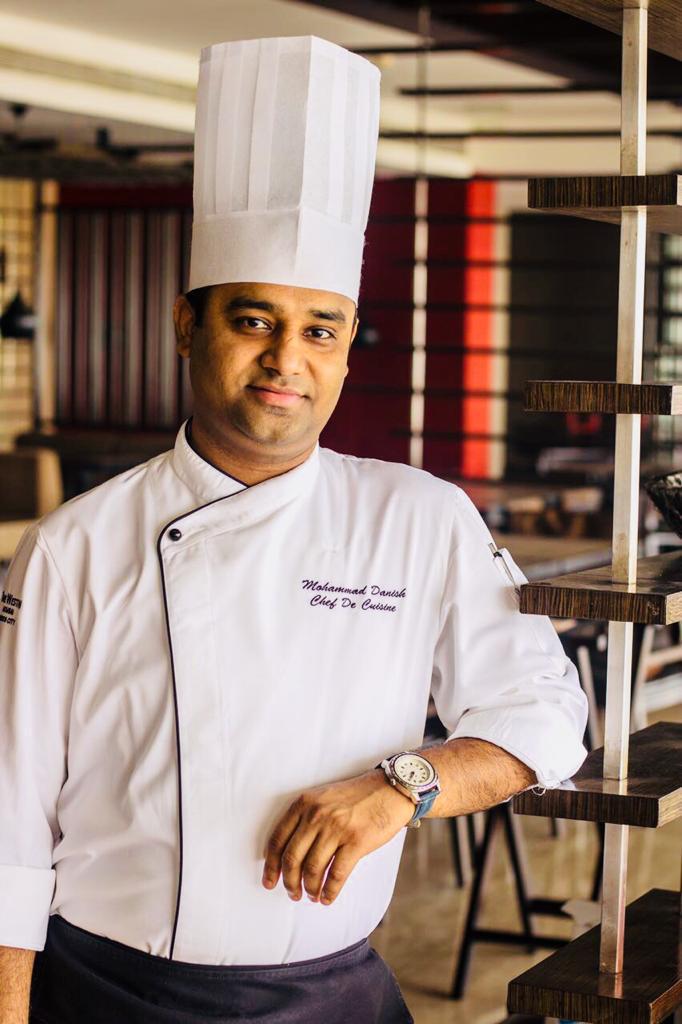
The history of Indian cuisine goes down many years. In the modern era its easy for people to forget the grassroot of Indian food, but for me that’s the most important aspect of Indian cuisine. The roots, The History, The culture and the forgotten recipes.
1. Tell us about your journey?
After attaining my diploma in management and culinary, I started my career with the ITC chola sheraton, Chennai. My journey started in the legendary restaurant which goes by the name of peshwari. It was there I exposed to all basic
Indian curries and cooking techniques. My curiosity grew and I always wondered about inception of the recipes that are made in today’s world. what were the origin, where were they evolved and why it is that these recipes are only famous in the certain religion of the country?
Through the years my curiosity grew. I kept on asking question regarding the recipe and where did the evolve and originate.My curiosity made me the chef I am today, THE SUCCESSOR OF THE ROYAL FAMILY.
2. How did you first decide to become a chef?
I was born and raised in Lucknow. The city boasts of being
the North Indian culture and artistics hub, it was also the seat of power of the nawabs. My family has a history of cooking for the royal family of Lucknow. As a kid I used to give a helping hand to my parents in the kitchen and learn to the tricks of the trade. It was my father who inspired me to continue the family tradition of cooking
for the royals of the Lucknow. “legend has it that my mother give birth to me in kadhai while my dad was cooking food
for one of the events organized by the royals”.
Just kidding, in short, I have seen my parent cook, my grandparents cook and I have always wanted to continue myf amily legacy.
3. Other than loving to research about the lost recipes what do you specialize in?
Since I am a descendant of the royal cook, I took pride in specializing in cooking for the royal weddings and create dynamic feasts in the concept of sajankot, pantoon royalR ajasthani theme Gadi Moda and cooking for the royal Gharana. I also have a nag for incorporating ancientt echniques like Zameen doz (pit roasting), dum pukht (concealed pot cooking), cooking in traditional copper andb rass utensils.
4. Can you explain more about Sajankot?
Well everyone has heard of the “BIG FAT INDIAN WEDDING”. But little do these guys know that these “BIG FAT WEDDINGS” have a lot of interesting ritual and traditions. such one ritual is the sajankot which is organized by the bride’s family the ritual usually occurs towards the end of the Jai mala and before the pheras.
This is an elaborate setting of food in which the groom family sits and is served by the bride family every dish on the menu is served to the groom’s family and it is made sure that they have eaten well. Food is served on silver thalis,
which are then gifted to the groom’s family. This is a way to welcome the groom and his family.
5. How would you describe a typical pontoon Rajasthani theme wedding?
Pontoon royal rajasthani theme has pontioon dining with gadi media bolsters, silk rugs and brass candle stands.
Traditional meals are served in gold plated thali amidst hand crafted bajot decorated with loral motifs. Personal butlers takes care of every necessity.
6. You said you learnt most of your cooking from your family, then why did you go to a culinary school, and how are the teachings different from an installation as compared to the home kitchen?
When I started first cooking at home, I just used to mug up recipe and produce what must be done. for example, I would just follow the recipes and go in accordance with that but when I entered college that was when I understood the role each ingredient played in that dish and why did we add that ingredient at the time and why it did not go into the dish and little earlier and later.Also, an institute teachers you to not only cook but also organize your work it helps you decide and make your own path towards your future and helps youg ain in depth knowledge of the cuisine.
You are entering also make you ask a lot of questions regarding the inceptiono f the dish.In short it not only helps in cooking but also gaining additional knowledge. A very humble and down to earth cook from the family of royal chefs.
Danish is one of the kind when it comes to implementing classic and lots recipes in his cooking, to showcase the origin of each dish. He also love to cook with passion and proud of the culinary roots, the journey he has taken to reach where is now.
He said Indian cuisine is so vast that no one can eat everything in one lifetime. Hence is additional towards finding the origins and history of everyday he comes across will never die as there is no end to Indian cuisine।
